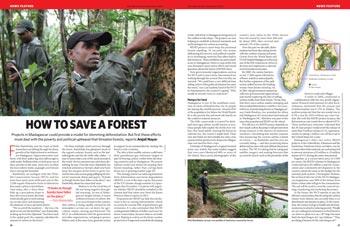Makira is on the front line of the war being waged to slow global warming. As one of Madagascar's largest forests, it stores millions of tonnes of carbon. But as in most forests in the country, that carbon is being rapidly released to the atmosphere as trees are cut down for agriculture, timber, mining and firewood. The WCS, in collaboration with the government and other organizations, is hoping to protect Makira and, at the same time, generate money to support local communities by 'renting' the forest to rich countries.
The idea is that wealthy nations could meet their greenhouse-gas emissions targets in part by buying carbon credits from developing countries such as Madagascar. The poorer nations could earn money by keeping their forests standing, rather than cutting them down (see 'A growing market').
This strategy, known as reducing emissions from deforestation and forest degradation (REDD), is one of the topics up for discussion at the UN climate-change summit in Copenhagen this December. Countries will negotiate whether REDD should be included in the climate deal that takes over from the Kyoto Protocol when it expires in 2012.
This article really gets into the political, cultural, and communication challenges we face in implementing payments for ecosystem services schemes like REDD, let alone in politically unstable developing countries. It definitely provides a sense of the daunting challenges humanity is facing right now -- as well as of the transformational opportunities.
Read more>>
...

No comments:
Post a Comment